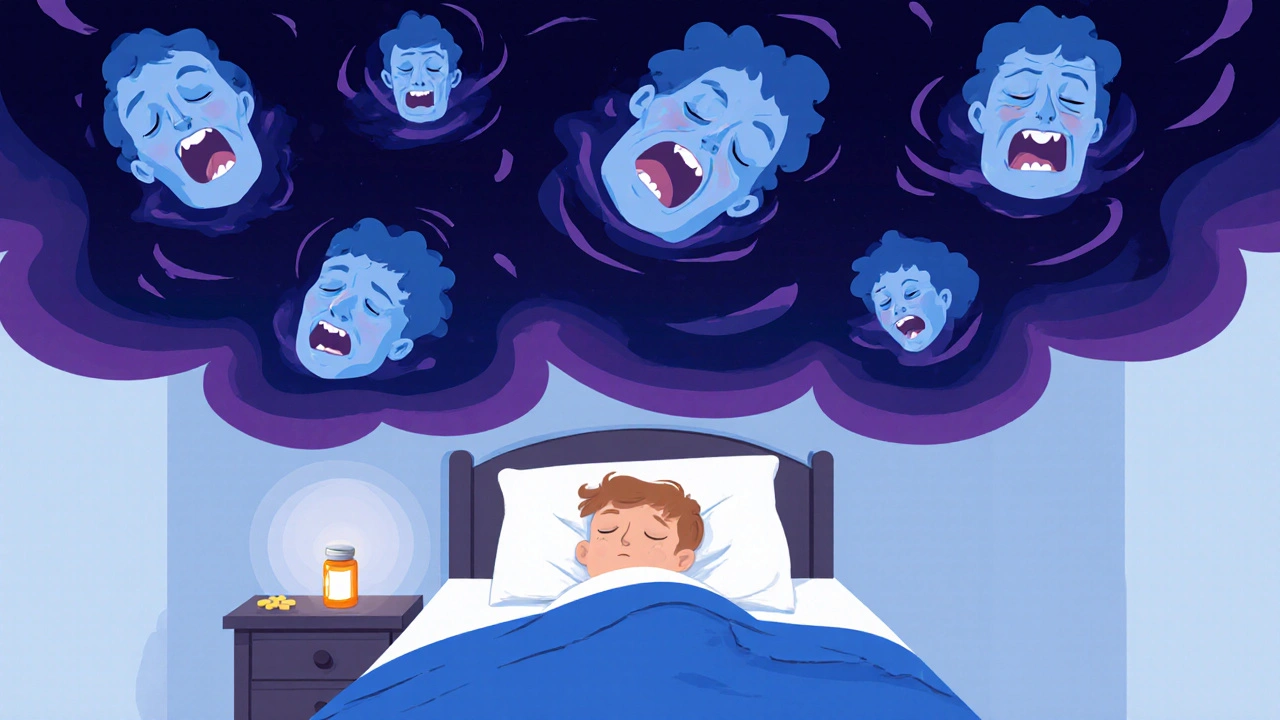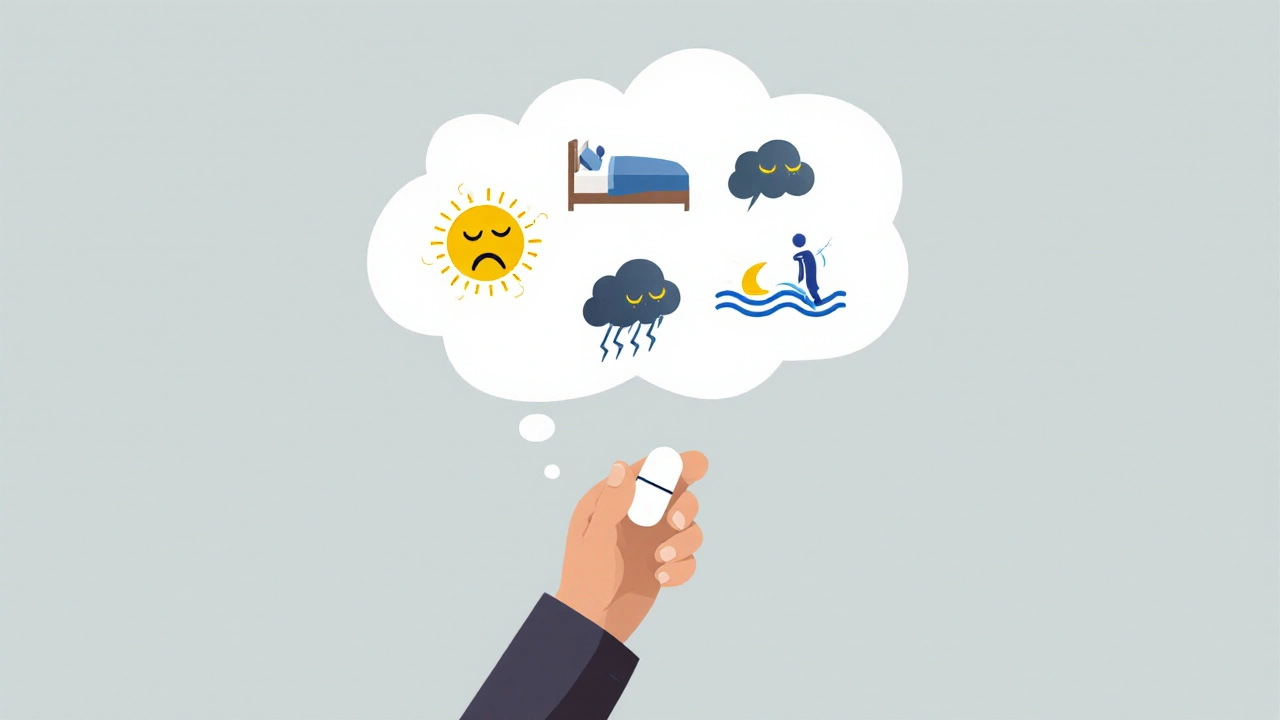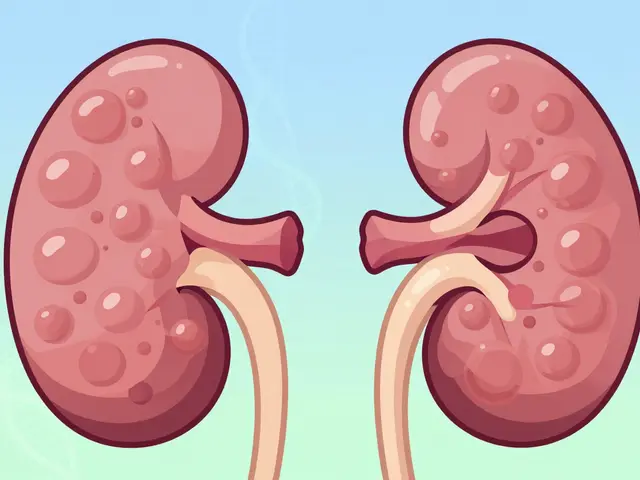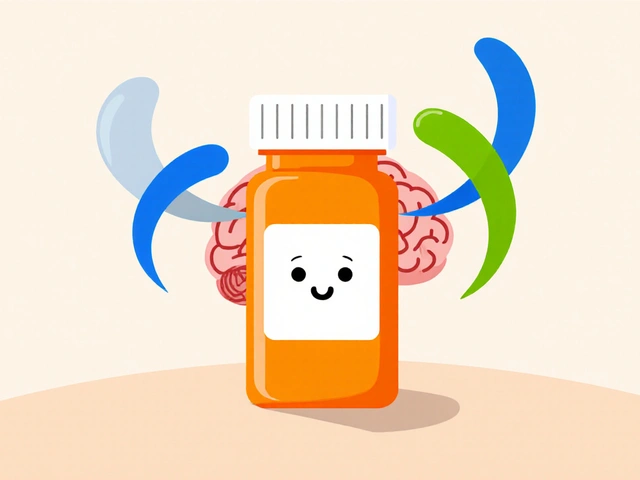Montelukast is a daily pill many people take to control asthma and allergies. It’s not a rescue inhaler, but it helps keep things under control over time. For millions, it works well. But like any medicine, it doesn’t come without risks. Some people notice strange changes in how they feel - mood swings, trouble sleeping, stomach upset, or even strange dreams. These aren’t rare. They’re common enough that doctors now routinely ask patients about them. If you’re taking montelukast and wondering if what you’re feeling is normal, you’re not alone.
What Montelukast Actually Does
Montelukast blocks leukotrienes - chemicals your body releases when you’re exposed to allergens or during an asthma flare-up. These chemicals cause swelling in your airways, mucus buildup, and tightening of muscles around your lungs. By blocking them, montelukast reduces inflammation and keeps your breathing easier. It’s not fast-acting like albuterol. It builds up in your system over days. That’s why you take it every night, even when you feel fine. The goal isn’t to fix symptoms right away - it’s to prevent them from happening.
Most Common Side Effects
Based on clinical data from the FDA and real-world reports from patients, here are the side effects you’re most likely to experience:
- Nausea or stomach pain - About 1 in 10 people report mild digestive upset, especially when they first start taking it.
- Headache - More common than you’d think. It’s usually mild and goes away after a week or two.
- Sore throat or cough - Often mistaken for a cold, but it’s linked to the drug’s effect on airway inflammation.
- Fatigue or drowsiness - Some people feel unusually tired, even if they’re sleeping enough.
- Sleep problems - This includes trouble falling asleep, waking up at night, or having vivid dreams. It’s more common in kids but happens in adults too.
These aren’t scary. Most fade after a few weeks as your body adjusts. But there’s one group of side effects that’s less talked about - and far more serious.
Neuropsychiatric Side Effects: The Hidden Risk
In 2020, the FDA added a boxed warning to montelukast after reviewing hundreds of reports linking it to serious mental health changes. This is the strongest warning they give. It doesn’t mean everyone will have these effects - but they happen often enough to be taken seriously.
People have reported:
- Depression - Feeling down, hopeless, or losing interest in things you used to enjoy.
- Anxiety - Unexplained panic, racing thoughts, or feeling on edge for no reason.
- Aggression or irritability - Sudden outbursts, even in people who’ve never been angry before.
- Hallucinations or confusion - Seeing or hearing things that aren’t there.
- Suicidal thoughts - Rare, but documented in both children and adults.
These don’t always show up right away. Sometimes they start after weeks or months. That’s why it’s so easy to miss. You might think, “I’m just stressed,” or “I’m going through a rough patch.” But if you notice a change in mood, behavior, or sleep that didn’t exist before you started montelukast - pay attention.
Who’s Most at Risk?
Not everyone gets these side effects. But some groups are more likely to:
- Children and teens - Their developing brains are more sensitive to chemical changes. Studies show higher rates of behavioral changes in kids on montelukast.
- People with existing mental health conditions - If you’ve had depression, anxiety, or bipolar disorder before, montelukast could make it worse.
- People taking multiple medications - Interactions with antidepressants, antihistamines, or even some OTC sleep aids can increase risk.
- Those who skip doses or take it inconsistently - Fluctuating levels in the blood can trigger neurological reactions.
If you fall into one of these groups, talk to your doctor before starting montelukast. There are other options.

How to Manage the Side Effects
If you’re experiencing side effects, don’t stop cold turkey. That can trigger a rebound asthma attack. Instead, follow these steps:
- Track your symptoms - Keep a simple journal. Note what you’re feeling, when it started, and how bad it is. Did the mood swings begin after you switched to a new bottle? Did the nightmares start after you took it with dinner? Details matter.
- Adjust timing - Take montelukast at least 2 hours before bedtime. Many people report fewer sleep problems when they don’t take it right before sleeping.
- Try it with food - If nausea is an issue, take it with a light snack. Avoid fatty meals - they can slow absorption and make stomach upset worse.
- Check for interactions - Avoid alcohol, antihistamines like diphenhydramine, and certain painkillers like ibuprofen. They can increase side effects.
- Give it time - For headaches, nausea, or fatigue, wait 10-14 days. Your body often adapts.
If mood changes or sleep issues persist beyond two weeks - talk to your doctor. Don’t wait. Don’t assume it’s “just stress.”
When to Call Your Doctor Immediately
Some side effects need urgent attention. Call your doctor or go to the ER if you experience:
- Thoughts of harming yourself or others
- Severe agitation, paranoia, or hallucinations
- Sudden, unexplained depression that doesn’t improve
- Seizures or loss of consciousness
These are rare, but they happen. And they’re treatable - if caught early.
Alternatives to Montelukast
If side effects are too much, there are other ways to control asthma and allergies:
- Inhaled corticosteroids - Fluticasone, budesonide. These are first-line for long-term asthma control and have fewer mental health risks.
- Antihistamines - Cetirizine or loratadine for allergies. They don’t help asthma, but they’re safer for mood.
- Biologics - Omalizumab or mepolizumab. These are injectables for severe asthma. Expensive, but very targeted and low risk for brain-related side effects.
- Allergy shots - Immunotherapy over 3-5 years can reduce or eliminate the need for daily meds.
Your doctor can help you weigh the pros and cons. Montelukast isn’t the only tool. And it’s not always the best one.
What to Do If You Want to Stop
Never stop montelukast without talking to your doctor. Stopping suddenly can cause your asthma to flare up. Instead:
- Ask for a gradual taper - some doctors reduce the dose over 1-2 weeks.
- Replace it with another controller medication before stopping.
- Monitor your breathing closely. Use a peak flow meter if you have one.
- Watch for rebound symptoms - increased wheezing, nighttime coughing, or needing your rescue inhaler more often.
Many people who stop montelukast due to side effects find their mood improves within days. Their sleep gets better. Their anxiety fades. It’s not magic - it’s your brain returning to normal after being exposed to a drug that affects its chemistry.
Final Thoughts
Montelukast is a useful tool - but it’s not harmless. The side effects aren’t just “in your head.” They’re real, documented, and sometimes serious. If you’re taking it and feeling off, don’t brush it off. Don’t assume it’s normal. Track it. Talk about it. Ask for alternatives. Your breathing matters. But so does your mind.
Can montelukast cause depression?
Yes. Montelukast has been linked to depression in clinical reports and FDA safety reviews. While not everyone experiences this, it’s a known and documented risk. People have reported feeling hopeless, losing interest in activities, or having persistent sadness after starting the medication. If you notice these symptoms, especially if they’re new or worsening, contact your doctor right away.
Is it safe to take montelukast with alcohol?
It’s not recommended. Alcohol can increase drowsiness and may worsen mood-related side effects like anxiety or depression. It can also affect how your liver processes montelukast, potentially raising the drug’s concentration in your blood. Even a small amount - like one drink - can make side effects more noticeable. If you’re taking montelukast, it’s safest to avoid alcohol altogether.
Do montelukast side effects go away over time?
Some do, some don’t. Mild side effects like nausea, headache, or fatigue often improve within 1-2 weeks as your body adjusts. But neuropsychiatric side effects - like mood changes, nightmares, or anxiety - usually don’t get better on their own. If they last longer than two weeks, they’re unlikely to resolve without stopping the medication. Waiting too long can make things worse.
Can children take montelukast safely?
Children can take montelukast, and it’s commonly prescribed for asthma and allergic rhinitis. But they’re at higher risk for behavioral side effects like aggression, irritability, sleep disturbances, and emotional outbursts. The FDA recommends close monitoring in kids. Parents should watch for sudden changes in mood or behavior and report them immediately. For many children, safer alternatives like inhaled steroids or antihistamines are better first choices.
What should I do if I miss a dose of montelukast?
If you miss a dose, take it as soon as you remember - unless it’s close to your next scheduled dose. Don’t double up. Missing one dose won’t cause an immediate asthma attack, but skipping doses regularly can reduce the drug’s effectiveness and increase the chance of rebound symptoms. Try setting a daily phone reminder. Consistency matters more than perfection.
Next Steps
If you’re currently on montelukast and unsure about how you’re feeling, start here:
- Write down any changes in mood, sleep, or behavior since you started the medication.
- Review your list with your doctor - don’t wait for your next scheduled appointment.
- Ask: “Are there other options that work just as well but have fewer risks?”
- If you’re having serious mental health symptoms, seek help immediately. Your safety comes first.
Medication isn’t one-size-fits-all. What works for one person might harm another. You have the right to ask questions. You have the right to try something else. Your health isn’t just about breathing - it’s about feeling like yourself.







I was on montelukast for my allergies and honestly? It was a game-changer for my breathing. But after about six weeks, I started having these terrifying nightmares-like, full-on horror movie stuff. I didn’t connect it until I read this post. I talked to my doc, we switched me to an inhaler, and within three days, I slept like a baby again. Don’t ignore weird dreams. They’re not just ‘stress.’
People take pills too lightly these days. If your mind goes weird, stop the drug. It’s not rocket science. Your brain isn’t a lab rat.
Y’all are kinda missing the point. Montelukast isn’t evil-it’s just not for everyone. I had the stomach stuff and headaches at first, but they faded. My anxiety? That was already there. I didn’t blame the pill. But I get it-if you’re new to meds or have a history, yeah, tread careful. My sister’s kid went from sweet to screaming after starting it. We pulled the plug fast. No regrets.
It’s fascinating how casually people dismiss neuropsychiatric side effects as ‘just stress.’ The FDA’s boxed warning is there for a reason, and yet, primary care physicians still prescribe this like it’s Advil. I’ve reviewed over 40 case studies on this. The latency period is the real danger-by the time patients realize it’s the drug, they’re already in crisis. Someone should be auditing prescribing patterns.
Oh wow. So now we’re treating asthma like it’s a personality disorder? Next thing you know, we’ll be blaming ibuprofen for existential dread. Someone get this man a TED Talk.
STOP SUFFERING IN SILENCE. If your mind feels off, your body is screaming. I was on this for a year, barely sleeping, crying for no reason-I thought I was broken. Then I quit. Within 72 hours, I was ME again. You deserve to feel normal. Don’t let fear of asthma keep you from your peace. Ask for alternatives. You got this.
Hey, I just want to say-this post is super helpful. I’ve been taking montelukast for my kid, and we’ve noticed he’s been more irritable lately. I didn’t know if it was school stress or the meds. Now I’m gonna track his mood and talk to the pediatrician. Thanks for the clear steps. You’re doing great work.
Let’s be real. The pharmaceutical industry doesn’t care about your mental health. Montelukast’s neuropsychiatric effects were buried in phase 3 trials for years. The FDA only acted after 2,000+ VA disability claims were filed. This isn’t a ‘side effect’-it’s a cover-up. And now they’re pushing ‘alternatives’ like biologics? $30,000/year injections? That’s not healthcare. That’s profit-driven coercion. Wake up.
I took this for two years. Felt like I was living inside a fog. Then one night, I woke up screaming because I thought my ceiling was breathing. I didn’t tell anyone for months. When I finally did, my doctor looked at me like I’d just confessed to a crime. We switched me to a nasal spray. I cried for three days-not from sadness, but from relief. I felt human again. If you’re reading this and you’re scared? You’re not alone. And you’re not crazy. It’s the pill.